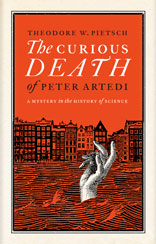Eighteenth-century contemporaries saw only a tragic accident when the promising ichthyologist Peter Artedi himself joined the fishes as he tumbled to his 1735 death in an Amsterdam canal. But in this fascinating and impeccably researched novel, Pietsch opens a more sinister possibility. For in a lightly fictionalized account of Artedi’s intense but strained friendship with the revolutionary biologist Carl Linnaeus, readers brush up against dark hints that the senior scientist connives in the younger researcher’s death. Even if Pietsch moves slightly beyond the historical evidence, the factually grounded bulk of the narrative makes his artistic interpolations entirely plausible. For, more than any other man in Holland, Linnaeus has the motive, means, and opportunity for snuffing out his brilliant young rival. Readers see, in particular, how the brilliant but arrogant and impulsive Linnaeus becomes inflamed with jealousy at his collaborator’’s accomplishments, finally boiling over with covetousness for Artedi’s groundbreaking manuscripts, craved as a vital prop for his own meisterwerk in biological classification. Himself a distinguished marine biologist, Pietsch recognizes what is at stake in these men’s science. But it is through imaginative vision, not science, that he fathoms the turbid emotions that can turn a towering but merciless genius against a vulnerable collaborator. A truly highbrow whodunit that will be of interest to readers of historical fiction, literary thrillers, and scientific history. |
